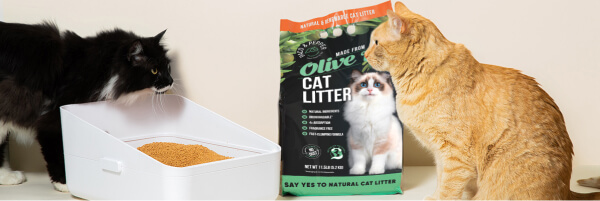Why is my cat sleeping in the litter box?

When a cat decides to sleep in a litter box, it can be puzzling and worrying for owners. Why is my cat sleeping in the litter box? This behavior is usually not normal and may indicate certain problems that need to be addressed. Let's look at possible reasons for this behavior and options for resolving this issue.
Is it normal for cats to sleep in litter box
Cats are known for being clean, so when one starts sleeping in the litter box, it is often a sign that something is wrong with the environment or with the cat's health.Is it normal for cats to sleep in a litter box? Let’s take a look at the main reasons why do your cats sleep in their litter boxes.
Why does my cat sleep in the litter box
Safety:
It is extremely important for cats to feel safe, especially in environments that they perceive as threatening or
unfamiliar. The litter box, with its familiar scent, can serve as a refuge where the cat feels protected from
outside threats. This is especially true in homes where open and safe resting areas may be scarce, or in
environments that feel cluttered to the cat. That's one of the most common reasons why do cats sleep in litter
boxes.
Health issues:
Why does my cat sleep in the litter tray?Poor health can also affect a cat's behavior, causing it to seek refuge
in the litter box. For example, cats with urinary tract infections (UTIs) or kidney disease may experience pain
while urinating. As a result, they may begin to stay close to the litter box or climb inside it due to the
frequent need to urinate, thereby experiencing relief. Likewise, cats with arthritis may find it easier to lie
down on soft litter as they find it more comfortable than a harder bed or floor surface, especially if the
litter box is at ground level and easy to enter.
Stress and anxiety:
Why is my cat suddenly sleeping in the litter box?Cats are sensitive creatures that can easily become stressed
due to changes in their environment or daily routine. New pets, new family members, or even minor furniture
rearrangements can disrupt your cat's sense of routine and security. At such times, the cat may hide in the
litter box to cope with the situation. A litter box provides a familiar smell and sense of territory that they
can control, which can be calming during times of stress. Additionally, in multi-cat households, less dominant
cats may spend more time in the litter box to avoid confrontation with more dominant cats, using the litter box
as a place of privacy and hiding.
Insufficient number of beds:
Cats are very sensitive to the environment in which they sleep and need comfort, warmth and security to rest
peacefully. When the home lacks bedding areas that meet these needs, cats may resort to alternative locations,
such as litter boxes. Unless beds are located in quiet, peaceful areas or have soft, cozy bedding, cats may find
the privacy and familiar smell of their litter box more attractive. To combat this, it is important for cat
owners to provide several attractive and comfortable lounging options throughout the home that suit their cat's
preferences for both warmth and safety.
Territorial issues:
In multi-cat households, the dynamics of space and hierarchy can greatly influence where the cat chooses to
spend time, including where she sleeps. Litter boxes can sometimes cause territorial disputes, especially if
there are too few litter boxes. According to many animal behaviorists, the general rule of thumb is to have one
litter box per cat, plus one extra. However, territorial problems can still arise if the dominant cat blocks
access to litter boxes or if litter boxes are placed too close together, creating a stressful environment.
When a cat decides to sleep in the litter box, it may be a sign of asserting dominance in this important territory, effectively controlling other cats' access to the litter box. This behavior can also be a sign of a lack of self-confidence; a less dominant cat may remain in the litter box to exploit the only territory it feels it can claim.
How to stop this behavior
Increased comfort:
To train your cat to sleep in the litter box, prioritize creating a home environment that promotes comfort and
safety. Evaluate the current sleeping options available to your cat. Make sure the bedding is soft and inviting,
located in low-traffic areas and away from loud noise. Cats prefer warmth and security, so consider placing beds
in sunny areas during the day or in quiet areas where they can have some quiet privacy. Cats also prefer
elevated areas as they provide a good vantage point and a sense of security. You may also want to consider
purchasing heated beds or pads, especially if your cat is older or has arthritis.
Stress Reduction:
Stress is a major factor that can cause a cat to fall asleep in the litter box. Maintain a routine that gives
your cat a sense of predictability in her daily life, which may include set feeding times, regular playtime, and
constant interaction. Tools such as pheromone diffusers can also help calm anxious cats. They secrete a
synthetic version of the cat facial pheromone that cats use to signal their environment as safe.
Increasing the number of litter trays:
In multi-cat households, having multiple litter boxes is critical to preventing conflict and stress. The general
rule is to have one box more than the number of cats in the house. For example, if you have three cats, provide
four litter boxes. Place these boxes in different areas of the house so that no one cat can monopolize access to
all the boxes. Each box should be in a low-traffic area and have at least two exits to avoid ambushes by other
cats. This setup helps reduce territorial disputes and gives each cat its own space, potentially reducing the
desire to sleep in the litter box as a form of territorial claim or defense.
By managing these factors—comfort, stress, and territorial issues—you can create an environment that meets your cat's needs for safety and privacy. This helps keep the litter box clean and in proper use and promotes your cat's overall well-being.


